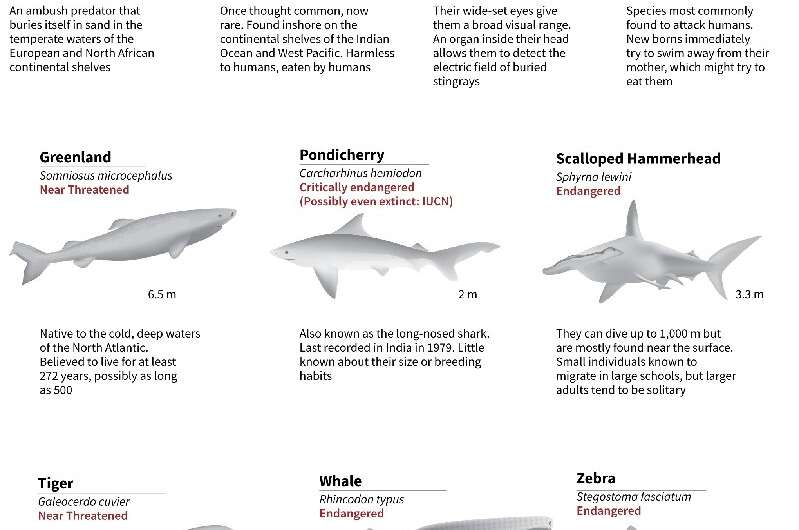Countries push to protect sharks, rays

Dozens of countries will push at a global meeting for regulations on trade in 18 types of shark and ray, with conservationists warning Thursday of looming extinction for many species.
"Sharks and rays are pretty much unmanaged still in fisheries around the world and are disappearing before our eyes," Luke Warwick of the Wildlife Conservation Society told reporters in Geneva.
His warning came ahead of a global meeting of conservationists and policymakers in the Swiss city set to evaluate changes to regulations and protection listings under the Convention on International Trade in Endangered Species (CITES).
Among the 56 proposed changes on the table are three calling for 18 shark and ray species to be listed under the treaty's Appendix II, under which trade in a plant or animal is subject to oversight and guarantees of sustainability.
About 30 countries back the three proposals concerning species of mako shark and a range of critically endangered ray species in the guitarfish and wedgefish families.
Observers hailed the record support, pointing out this is the biggest number of sponsors ever to back a proposal under the four decades-old treaty.
Abdulla Naseer, the environment minister of the Maldives which co-sponsored the proposals, told reporters that listing the species would help their "populations recover before it is too late."

"We want to see these species protected for health oceans and future generations," he told reporters.
Looming extinction?
Sharks have stalked the oceans for more than 400 million years but are now under threat from a devastating predator—humans.
Upwards of 100 million sharks are fished every year, mainly for their valuable fins, which can fetch as much as $1,000 per kilo.
Of the 59 species of rays and sharks evaluated by the International Union for the Conservation of Nature (IUCN), 17 are classified as being at risk of extinction as overfishing and habitat destruction continues apace.
But until 2013, none were listed under CITES, which has traditionally focused on land-based plants and animals.
Fishing nations have in the past voiced strong opposition to CITES listings of fisheries species, which are already covered by a number of international treaties.

But proponents maintain that the convention, which is legally binding and has a powerful enforcement mechanism, has proven far more effective at pushing countries towards better species management.
Conservationists hailed the strong support for the shark and ray proposals to be debated and voted on at the 12-day meeting opening Saturday, but stressed their approval would only be the first step.
Sharks and rays mature slowly and have few young, so it takes a long time for threatened populations to recover.
If fishing of mako sharks were to stop immediately, "scientists estimate that it will be 2070 before the population recovers even to the base level, where fishing would be advisable again," Warwick said.
Scientists looking for guitarfish and wedgefish in places where they used to be abundant are now lucky if they spot one a week, said Rima Jabado, founder of the Elasmo Project.
"If we don't start doing something very quickly, the inevitable is actually extinction very, very quickly," she warned.
© 2019 AFP





















